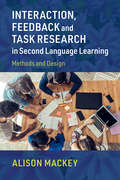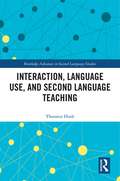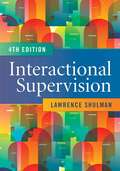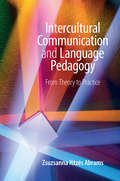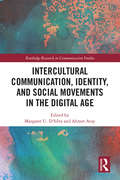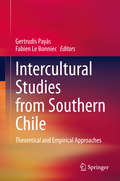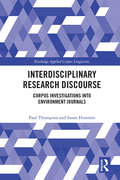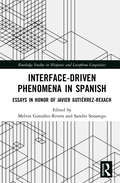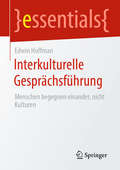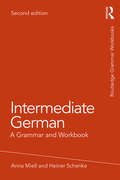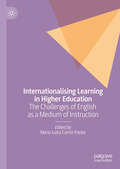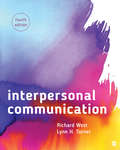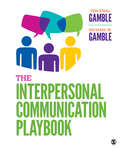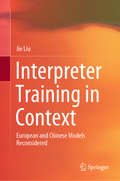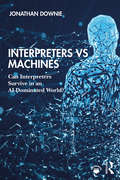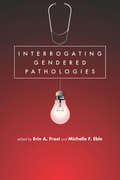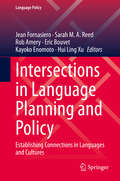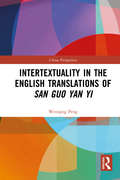- Table View
- List View
Interaction, Feedback and Task Research in Second Language Learning: Methods and Design
by Alison MackeyThe role of interaction and corrective feedback is central to research in second language learning and teaching, and this volume is the first of its kind to explain and apply design methodologies and materials in an approachable way. Using examples from interaction, feedback and task studies, it presents clear and practical advice on how to carry out research in these areas, providing step-by step guides to design and methodological principles, suggestions for reading, short activities, memory aids and an A-Z glossary for easy reference. Its informative approach to study design, and in-depth discussions of implementing research methodology, make it accessible to novice and experienced researchers alike. Commonly used tools in these paradigms are explained, including stimulated recalls, surveys, eye-tracking, metanalysis and research synthesis. Open research areas and gaps in the literature are also discussed, providing a point-of-departure for researchers making their first foray into interaction, feedback and task-based teaching research.
Interaction, Language Use, and Second Language Teaching (Routledge Advances in Second Language Studies)
by Thorsten HuthThis book presents a view of human language as social interaction, illustrating its implications for language learning and second language teaching. // The volume advocates for researchers, practitioners, and administrators to rethink and reconceptualize an understanding of language beyond that of the written word to one encompassing social and interactional activity built on co-construction, collaboration, and negotiation. The book emphasizes the ways in which this view of language can shed light on the language learning process as one which draws on discrete linguistic units and constructions in conjunction with a range of temporal, sequential, and embodied resources across a variety of social contexts. In turn, these insights prompt further reflection and discussion on their implications for advancing second language teaching practice. // This book will be key reading for scholars interested in second language teaching research, as well as active second language teachers and language program administrators.
Interactional Supervision
by Lawrence ShulmanClinical supervision is fraught with difficulties, and those who transition from frontline worker to supervisor often receive little training or support, particularly when it comes to the interpersonal skills needed for implementing complex human relations tasks. Left to their own devices, clinical supervisors must navigate myriad challenges like these real-world examples: <p><p>A supervisor decided that the evaluation process would be a good time to level with a long-term staff member about his inadequate performance. She reviewed the staff member s personnel record and discovered that previous supervisors had given the employee consistently positive and obviously false evaluations. She dreaded the approaching conference, expecting the worker to be angry. <p><p>A supervisor was asked by her administrator to back her up when staff were notified of budget cuts that would result in pay cuts and heavier caseloads. At a team meeting, one worker, who appeared to be speaking for the rest, said to the supervisor, You are going to be with us on this one, aren't you? <p><p>A recently promoted Black supervisor heard that many members of the largely White staff thought he had obtained the promotion because of the agency s affirmative action program. Nothing was said directly; however, he could sense tension in the staff group. He felt angry, hurt, and bitter at the racist element in his reception and increasingly isolated at the agency. <p><p>Drawing on decades of his own experience and the experiences of those he has trained, Lawrence Shulman provides clear, simple models of supervision using a conversational tone and practical advice in this must-have resource. <p><p>Every phase of supervision is discussed in detail, with a focus on communication, making demands for work, facing taboo subjects, and transitioning into and out of roles and relationships. Strategies for group work and meetings include everyday challenges; trauma, such as client deaths; violence against frontline workers; and cutbacks. Supervisors will learn how to apply Shulman s parallel process framework in their interactions with frontline workers to model ideal interactions between workers and their clients. <p><p>In this fourth edition, evidence-based practices and interventions are updated to include the latest ethical and legal aspects of supervision and also feminist; lesbian, gay, bisexual, transgender, queer, and questioning; and trauma-informed practice.
Intercultural Communication and Language Pedagogy: From Theory To Practice
by Zsuzsanna I. AbramsLearning a new language offers a unique opportunity to discover other cultures as well as one's own. This discovery process is essential for developing 21st-century intercultural communication skills. To help prepare language teachers for their role as guides during this process, this book uses interdisciplinary research from social sciences and applied linguistics on intercultural communication for designing teaching activities that are readily implemented in the language classroom. Diverse language examples are used throughout the book to illustrate theoretical concepts, making them accessible to language teachers at all skill levels. The chapters introduce various perspectives on culture, intercultural communicative competence, analyzing authentic language data, teaching foreign/second languages with an intercultural communication orientation, the intercultural journey, the language-culture-identity connection, as well as resolving miscommunication and cultural conflict. While the immediate audience of this book is language teachers, the ultimate beneficiaries are language learners interested in undertaking the intercultural journey.
Intercultural Communication, Identity, and Social Movements in the Digital Age (Routledge Research in Communication Studies)
by Margaret U. D’Silva; Ahmet AtayThis book examines the complex and multidimensional relationship between culture and social media, and its specific impact on issues of identity and social movements, in a globalized world. Contemporary cyber culture involves communication among people who are culturally, nationally, and linguistically similar or radically different. Social media becomes a space for mediated cultural information transfer which can either facilitate a vibrant public sphere or create cultural and social cleavages. Contributors of the book come from diverse cultural backgrounds to provide a comprehensive analysis of how these social media exchanges allow members of traditionally oppressed groups find their voices, cultivate communities, and construct their cultural identities in multiple ways.This book will be of great relevance to scholars and students working in the field of media and new media studies, intercultural communication, especially critical intercultural communication, and academics studying social identity and social movements.
Intercultural Studies from Southern Chile: Theoretical and Empirical Approaches
by Gertrudis Payàs Fabien Le BonniecThis book presents a multidisciplinary overview of a little known interethnic conflict in the southernmost part of the Americas: the tensions between the Mapuche indigenous people and the settlers of European descent in the Araucania region, in southern Chile. Politically autonomous during the colonial period, the Mapuche had their land confiscated, their population decimated and the survivors displaced and relocated as marginalized and poor peasants by Chilean white settlers at the end of the nineteenth century, when Araucania was transformed in a multi-ethnic region marked by numerous tensions between the marginalized indigenous population and the dominant Chileans of European descent.This contributed volume presents a collection of papers which delve into some of the intercultural dilemmas posed by these complex interethnic relations. These papers were originally published in Spanish and French and provide a sample of the research activities of the Núcleo de Estudios Interétnicos e Interculturales (NEII) at the Universidad Católica de Temuco, in the capital of Araucania. The NEII research center brings together scholars from different fields: sociocultural anthropology, sociolinguistics, ethno-literature, intercultural education, intercultural philosophy, ethno-history and translation studies to produce innovative research in intercultural and interethnic relations. The chapters in this volume present a sample of this work, focusing on three main topics: The ambivalence between the inclusion and exclusion of indigenous peoples in processes of nation-building.The challenges posed by the incorporation of intercultural practices in the spheres of language, education and justice.The limitations of a functional notion of interculturality based on eurocentric thought and neoliberal economic rationality. Intercultural Studies from Southern Chile: Theoretical and Empirical Approaches will be of interest to anthropologists, linguists, historians, philosophers, educators and a range of other social scientists interested in intercultural and interethnic studies.
Interdisciplinary Research Discourse: Corpus Investigations into Environment Journals (Routledge Applied Corpus Linguistics)
by Paul Thompson Susan HunstonInterdisciplinary Research Discourse: Corpus Investigations into Environment Journals provides cutting-edge insights into the nature of communication in interdisciplinary research domains. Using a corpus of nearly 12,000 articles taken from 11 journals, this book addresses the key questions that surround writing for an interdisciplinary audience. This books also explores: the ways in which writers write if they are writing for an interdisciplinary audience as well as for a specialist disciplinary audience; the different natures and instances of the term 'interdisciplinarity'; and whether an analysis of the rhetorical contexts in which research is relayed to interdisciplinary audiences is critical to understanding interdisciplinary research activities and communications. Written by two leading figures in the field of Corpus Linguistics, this is an essential text for researchers and upper-level undergraduates working in the areas of Corpus Linguistics, Discourse Analysis and Linguistics in areas of interdisciplinary communication.
Interface-Driven Phenomena in Spanish: Essays in Honor of Javier Gutiérrez-Rexach (Routledge Studies in Hispanic and Lusophone Linguistics)
by Melvin González-Rivera Sandro SessaregoInterface-Driven Phenomena in Spanish: Essays in Honor of Javier Gutiérrez-Rexach brings together a collection of articles from leading experts in the fields of formal syntax and semantics. With a specific focus on interface-related phenomena, the articles address a broad array of issues in Spanish grammar. In so doing, the book offers an updated view on current research topics while providing a rich variety of methods and theoretical perspectives. The volume will be of interest to advanced students, researchers and scholars working on Spanish syntax, semantics and their interfaces.
Interkulturelle Gesprächsführung: Menschen begegnen einander, nicht Kulturen (essentials)
by Edwin HoffmanWir alle kommen mit der Superdiversität der Gesellschaft in Kontakt, die zeigt, wie geschichtet, kontextabhängig und veränderlich sich Menschen sozial organisieren und identifizieren. Kulturelle Identität ist schon lange nicht mehr nur mit der nationalen Herkunft identisch, Autochthone und Migranten aus zahlreichen Herkunftsländern haben jeweils ihre eigene Vielfalt an Bevölkerungsgruppen und sozialen Kategorien. Was bedeutet diese Superdiversität für die professionelle Kommunikation? Edwin Hoffman bietet in diesem essential mit vielen Beispielen einen innovativen Ansatz, der auf zwischenmenschlicher Kommunikation und nicht auf der Begegnung von Kulturen basiert. Das TOPOI-Modell enthält Handlungsstrategien zur Reflexion und Überbrückung von Kommunikationsunterschieden.
Intermediate German: A Grammar and Workbook (Grammar Workbooks)
by Anna Miell Heiner SchenkeIntermediate German: A Grammar and Workbook is designed for learners who have achieved basic proficiency and now wish to progress to more complex language. Each of the units combines concise grammar explanations with examples and exercises to help build confidence and fluency. The new edition includes: up-to-date cultural aspects of German-speaking countries extended entries on adverbs and the imperative Did you know? sections with tips on learning strategies, and on contemporary usage more exercises to refine retention Suitable for students learning with or without a teacher, Intermediate German forms a structured course of the essentials of German grammar and is suitable for students at intermediate level, corresponding to levels A2–B1+ on the CEFR or Intermediate High/Advanced Low with the ACTFL.
International Law's Collected Stories (Palgrave Studies in International Relations)
by Sofia Stolk Renske VosThis edited volume presents a collection of stories that experiment with different ways of looking at international law. By using different literary lenses -namely, storytelling, the novel, the drama, the collage, the self-portrait, and the museum- the authors shed light on elements of international law that usually remain unseen or unheard and expose the limits of what international law can do. We inquire into who the storytellers of international law are, the stages on which they tell their stories, and who are absent in these tales. We present it as a collection: a set of different essays that more or less deal with the same subject matter. Alternatively, we would like to call it a potpourri of stories, since the diversity of topics and approaches is eclectic and unconventional. By placing multiple perspectives alongside each other we aim to compare and contrast, to allow for second thoughts, and to rediscover. In doing so, we engage with the ambiguities of international law’s characters and spaces, and with the worldviews they reflect and worlds they create.
Internationalising Learning in Higher Education: The Challenges of English as a Medium of Instruction
by María Luisa Carrió-PastorThis edited book examines the use of English as a Medium of Instruction (EMI) in a variety of international higher education contexts. The internationalization of education – indicated by increasing mobility of students, staff and ideas, as well as by policies and programmes put in place to facilitate educational exchange - has led to increasing adoption of English as a Lingua Franca (ELF) for educational purposes. In this book, the authors present the results of empirical research into the implementation, assessment, development and use of EMI programmes in different settings, presenting the case for more structured training of teachers and staff. It will be of interest to second/foreign language teaching and administrative staff, as well as anyone else involved in teaching in English at higher education level.
Interpersonal Communication
by Richard West Dr Lynn H TurnerInterpersonal Communication, Fourth Edition empowers you to become a more confident communicator by providing you with both the knowledge and the practical skills you need to make effective communication choices in today's rapidly changing and technologically advanced society. Rather than "telling" you how to communicate, authors Richard L. West and Lynn H. Turner offer a toolbox of key skills pertaining to each communication theory so you can actively choose and experiment with strategies appropriate for a given situation. Filled with realistic examples and scenarios that reflect the diversity and interactions of today's students, this practical text makes clear connections among theory, skills, and the life situations we all encounter on a daily basis. New to the Fourth Edition: New personal reflection questions for the IPC Careers and IPC Around Us features help you discover the relevance of interpersonal communication in your everyday life. A new applied theory feature, IPC Praxis, shows you how to apply the theories outlined in the chapter narrative to your life experiences. New chapter wrap-ups, key questions for application, and communication application tests provide you with opportunities to assess what you have learned in the chapter. SAGE edge provides you with helpful tools, including eFlashcards, practice quizzes, and more, in one easy-to-use online environment.
Interpersonal Communication
by Richard West Dr Lynn H TurnerInterpersonal Communication, Fourth Edition empowers you to become a more confident communicator by providing you with both the knowledge and the practical skills you need to make effective communication choices in today's rapidly changing and technologically advanced society. Rather than "telling" you how to communicate, authors Richard L. West and Lynn H. Turner offer a toolbox of key skills pertaining to each communication theory so you can actively choose and experiment with strategies appropriate for a given situation. Filled with realistic examples and scenarios that reflect the diversity and interactions of today's students, this practical text makes clear connections among theory, skills, and the life situations we all encounter on a daily basis. New to the Fourth Edition: New personal reflection questions for the IPC Careers and IPC Around Us features help you discover the relevance of interpersonal communication in your everyday life. A new applied theory feature, IPC Praxis, shows you how to apply the theories outlined in the chapter narrative to your life experiences. New chapter wrap-ups, key questions for application, and communication application tests provide you with opportunities to assess what you have learned in the chapter. SAGE edge provides you with helpful tools, including eFlashcards, practice quizzes, and more, in one easy-to-use online environment.
The Interpersonal Communication Playbook
by Teri Kwal Gamble Michael W. GamblePractical skills for developing successful relationships—both face-to-face and online Written in a conversational style and presented in an innovative handbook format, The Interpersonal Communication Playbook empowers you to take an active role in the development of your communication skills. Best-selling authors Teri Kwal Gamble and Michael Gamble provide you with abundant opportunities to make personal observations, analyze personal experiences, and assess personal growth across interpersonal contexts. Offering an array of communication settings for you to practice your skills, this text makes it easy for you to see how relevant theory can be applied to develop and maintain healthy relationships with family, friends, romantic partners, and coworkers. Key Features Insightful, relatable examples and real-world scenarios engage you and encourage you to critically reflect on your own communication dynamics. “Learning objectives at the beginning of each chapter outline key objectives and help you master important concepts and prepare for exams. Opening vignettes introduce the relevance of chapter content through a contemporary example of communication in action, exemplifying chapter themes with engaging and relevant stories. “What Do You Know?” features promotes self-assessment of knowledge and encourages you to address any misconceptions you discover. “Try This” boxes promote active learning and provide you with opportunities to put your skills into practice. “Reflect On This” boxes connect theory with practice—bringing key concepts and ideas to life. “Analyze This” boxes encourage you to apply critical thinking to examples of interpersonal encounters from literature and popular culture. “Connect the Case” features includes chapter-ending cases designed to help you assess interpersonal communication outcomes to help solidify and further develop the skills learned.
The Interpersonal Communication Playbook
by Teri Kwal Gamble Michael W. GamblePractical skills for developing successful relationships—both face-to-face and online Written in a conversational style and presented in an innovative handbook format, The Interpersonal Communication Playbook empowers you to take an active role in the development of your communication skills. Best-selling authors Teri Kwal Gamble and Michael Gamble provide you with abundant opportunities to make personal observations, analyze personal experiences, and assess personal growth across interpersonal contexts. Offering an array of communication settings for you to practice your skills, this text makes it easy for you to see how relevant theory can be applied to develop and maintain healthy relationships with family, friends, romantic partners, and coworkers. Key Features Insightful, relatable examples and real-world scenarios engage you and encourage you to critically reflect on your own communication dynamics. “Learning objectives at the beginning of each chapter outline key objectives and help you master important concepts and prepare for exams. Opening vignettes introduce the relevance of chapter content through a contemporary example of communication in action, exemplifying chapter themes with engaging and relevant stories. “What Do You Know?” features promotes self-assessment of knowledge and encourages you to address any misconceptions you discover. “Try This” boxes promote active learning and provide you with opportunities to put your skills into practice. “Reflect On This” boxes connect theory with practice—bringing key concepts and ideas to life. “Analyze This” boxes encourage you to apply critical thinking to examples of interpersonal encounters from literature and popular culture. “Connect the Case” features includes chapter-ending cases designed to help you assess interpersonal communication outcomes to help solidify and further develop the skills learned.
Interpersonal Positioning in English as a Lingua Franca Interactions (Routledge Research in Language and Communication)
by Svitlana Klötzl Birgit SwobodaThis book offers a critical reflection on interpersonal positioning across both large- and small-scale contexts and highlights the multi-faceted nature of intercultural communication in today’s global world. The volume establishes positioning primarily as the negotiation of interpersonal relationships, and draws on concepts from across disciplines by way of reappraisal before applying them to two specific domains: MMORPGs (Massively Multiplayer Online Role-Playing Games) and private ELF couple interaction. While acknowledging and showcasing the unique features of positioning in these two contexts, Klötzl and Swoboda point to their commonalities by looking at how language and specifically English is used as a communicative resource in lingua franca situations. The book also identifies new directions for future methodological innovations in that it demonstrates how the same interaction can be looked at in methodologically-different ways and how the authors’ own positions projected on to such interaction create an integrated tri-partite perspective on the two domains. Shedding light on interpersonal positioning in different contexts and in turn on global communication more generally, this book will be of particular interest to students and researchers in discourse analysis, pragmatics, computer-mediated communication, sociolinguistics, and applied linguistics.
Interpreter Training in Context: European and Chinese Models Reconsidered
by Jie LiuThis book addresses an important, yet under-researched domain in interpreting education: how theoretical training models should be responsive to context. To do so, it applies the linguistic concept of ‘context’ to interpreting studies by investigating practices in representative (conference) interpreting training programmes in Europe and China. After presenting an overview of interpreter training programmes, the author describes the need to reassess the applicability of the well-established and widely accepted model of interpreting from the Paris School (ESIT/AIIC model) to the Chinese interpreting training scene.Building on the theoretical study of context in foreign language classrooms suggested by linguists like Halliday and Hasan (1993); Kramsch (1993) and others, the author subsequently constructs a new curriculum, comprising a four-step approach to consecutive interpreting courses in the Chinese context. The rationale for such an approach is justified in accordance with the overall design of context, taking into account the four dimensions in a teaching–learning environment.This book is intended for scholars and graduate students who are interested in translation and interpreting, applied linguistics as well as foreign language education. It also serves as a practical guide for developing (university-level) translation and interpreting programmes.
Interpreters vs Machines: Can Interpreters Survive in an AI-Dominated World?
by Jonathan DownieFrom tech giants to plucky startups, the world is full of companies boasting that they are on their way to replacing human interpreters, but are they right? Interpreters vs Machines offers a solid introduction to recent theory and research on human and machine interpreting, and then invites the reader to explore the future of interpreting. With a foreword by Dr Henry Liu, the 13th International Federation of Translators (FIT) President, and written by consultant interpreter and researcher Jonathan Downie, this book offers a unique combination of research and practical insight into the field of interpreting. Written in an innovative, accessible style with humorous touches and real-life case studies, this book is structured around the metaphor of playing and winning a computer game. It takes interpreters of all experience levels on a journey to better understand their own work, learn how computers attempt to interpret and explore possible futures for human interpreters. With five levels and split into 14 chapters, Interpreters vs Machines is key reading for all professional interpreters as well as students and researchers of Interpreting and Translation Studies, and those with an interest in machine interpreting.
Interrogating Gendered Pathologies
by Erin A Frost Michelle F. EbleInterrogating Gendered Pathologies points out and critiques unjust patterns of pathology. Erin A. Frost and Michelle F. Eble assemble a transdisciplinary approach from/to technologies, rhetorics, philosophies, epistemologies, and biomedical data to consider the effects of biomedicine’s gendered norms on people’s lives. Using a range of complementary and intersectional theoretical approaches, contributors ask questions about rhetoric’s role in healthcare and how it differs depending on patient embodiment and the ways nonnormative bodies are pathologized. These chapters engage common narratives about the ways in which gender in healthcare is secondary and highlights the stories of people who have battled to prioritize their own bodies through extraordinary difficulties. Employing a multiplicity of voices, the book represents a number of different perspectives on what it might look like to return health and medical data to embodied experience, to consider the effects of gendered and intersectional biomedical norms on lived realities, and to subvert the power of institutions in ways that move us toward biomedical justice. This collection contributes to the burgeoning field of health and medical rhetorics by rhetorically and theoretically intervening in what are often seen as objective and neutral decisions related to the body and to scientific and medical data about bodies. Interrogating Gendered Pathologies will be of interest to feminist scholars in the field of rhetoric and writing studies, specifically those in the rhetorics of health and medicine, as well as scholars of technical communication, feminist studies, gender studies, technoscience studies, and bioethics. Contributors: Leslie Anglesey, Mary Assad, Beth Boser, Lillian Campbell, Marleah Dean, Lori Beth De Hertogh, Leandra Hernandez, Elizabeth Horn-Walker, Caitlin Leach, Jordan Liz, Miriam Mara, Cathryn Molloy, Kerri Morris, Maria Novotny, Sage Perdue, Colleen Reilly
Intersections in Language Planning and Policy: Establishing Connections in Languages and Cultures (Language Policy #23)
by Hui Ling Xu Jean Fornasiero Sarah M. A. Reed Rob Amery Eric Bouvet Kayoko EnomotoThis volume encompasses the range of issues encountered by language scholars who teach and research in departments of languages and cultures within the higher education system, predominantly in Australia, but touching other universities worldwide. Related studies on language planning, methodology or pedagogy have focused on one or more of these same issues, but rarely on their totality. Intersections as a metaphor running discreetly through the essays in this volume, connects them all to a lived reality. The field of languages and cultures, as it is practised and reflected upon in Australian universities, is essentially an interdisciplinary and interconnecting space - one in which linguistic and disciplinary diversities meet and join forces, rather than collide or disperse along different pathways. The international and local studies featured here focus on language planning, new pedagogies and language reclamation and link to meeting points and commonalities. They show that language scholars are increasingly finding themselves on common ground as they tackle issues of policy and practice affecting their field, whether within their institutions, within the tertiary system, or within the framework of government policy.
Intertextuality in the English Translations of San Guo Yan Yi (China Perspectives)
by Wenqing PengSan Guo Yan Yi is one of the best-known classic Chinese novels in the English-speaking world. The earliest English translation came out in 1820, while a range of further translations have been produced over the past two hundred years. How do the different versions relate to each other? This volume examines the intertextual relations between the English translations of San Guo Yan Yi. Intertextuality refers to the interdependence of texts in relation to one another. Focusing on the perspectives of impact, quotation, parallels and transformation, the author compares a range of the translated versions, including two full-length translations and over twenty excerpted renderings and partial adaptations since the 1820s. She discovers that excerpted translations are selected to fit the translators’ own narrations, and are adapted to many genres, such as poetry, drama, fairytales, and textbooks. Moreover, the original text, translated texts and other related English works are interconnected in one large network, for which intertextuality offers an ideal basis for research. Students and scholars of Chinese literature and translation studies will benefit from this book.
Into Literature: Grade 10
by Houghton Mifflin HarcourtInto Literature Student Edition Hardcover VRS1 Grade 10
